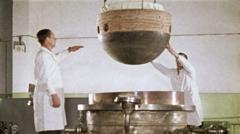A fragment of a Soviet-era spacecraft, Kosmos 482, is believed to have re-entered Earth's atmosphere after lingering in orbit for more than 50 years. The European Space Agency (ESA) confirmed that one piece, likely the lander, re-entered around 06:16 GMT on Saturday. The probe was initially launched in 1972 for a mission to Venus but never escaped Earth’s orbit and fragmented into four parts.
Currently, there is uncertainty regarding whether this fragment fell to the ground or completely disintegrated upon re-entry. The European Space Surveillance and Tracking center (SST) believes it's highly probable that the object re-entered over the ocean, considering that around 70% of Earth's surface is covered by water, hence minimizing risks of damage.
Stijn Lemmens, a senior analyst at ESA, likened the chances of being hit by the debris to winning the lottery, underscoring the minimal risk to human safety. Kosmos 482’s robust lander capsule, engineered to withstand the severe conditions of Venus, features a solid heat shield that may aid its survival during the descent through Earth's atmosphere. However, its parachute system—designed to slow descent towards Venus—is likely degraded after over half a century in space.
Lemmens pointed out that re-entries of man-made objects are not rare; larger spacecraft re-enter weekly, while smaller objects do so daily, often burning up before reaching the surface. Notable recent events include China's Long March 5B booster, which re-entered over the Indian Ocean in 2022, and the Tiangong-1 space station, which primarily burned up above the Pacific Ocean in 2018.
Kosmos 482 is now under the watchful eye of international space agencies. Lemmens advocates for future spacecraft to be designed with the capability to accomplish controlled re-entries, enhancing prediction accuracy for landing sites. This approach aims to mitigate the risk of space debris impacting populated areas, ensuring the safety of people and property while addressing environmental impacts associated with space debris.

















